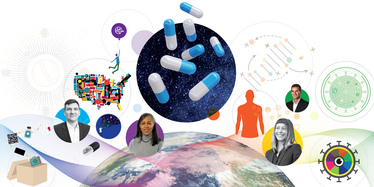The Multifaceted Future of Pharma – Chapter 1: The Big Picture

Read on for thoughts on AI, digitalization, sustainability initiatives, continued innovation in cell and gene therapies, and a growing focus on accessibility versus pricing
What we asked: “Looking ahead to the next 5–10 years, what will be the key disruptors and/or what can be improved upon in the pharma industry?”

Marcel de Matas
New Drug Modalities and Digitalization – with Marcel de Matas, CTO & Co-Founder, Seda Pharmaceutical Development Services:
“Complex medicines, particularly gene therapies, nucleic acid therapies, and mRNA-based vaccines, have reshaped the landscape. The COVID-19 pandemic was a critical turning point, accelerating the development and approval of mRNA vaccines, which proved to be a powerful tool in responding to global health emergencies. This success sparked tremendous interest in biotech companies and expanded the capabilities of health agencies, leading to more streamlined clinical testing, expansion in contract development and a boom in manufacturing capacity in this area. Looking ahead, we can expect this trend to continue, with even more focus on genomic medicines, particularly gene editing products, as these technologies mature and start becoming approved therapies.
“Digitalization has also revolutionized how the industry operates. Over the past decade, we have seen AI become a cornerstone in drug discovery, helping to identify promising therapeutic candidates much faster. Similarly, modeling and simulation have improved our ability to predict drug performance in humans, while automation is beginning to transform manufacturing processes, ensuring consistent quality and manufacturing efficiency. Remote and virtual disease management has also surged, driven by advancements in mobile technology and accelerated by the pandemic with greater demand for virtual consultations. In the next ten years, these digital innovations will continue to evolve, with AI, automation, and virtual healthcare becoming even more integral to the industry, and making personalized, data-driven care the norm.”



















